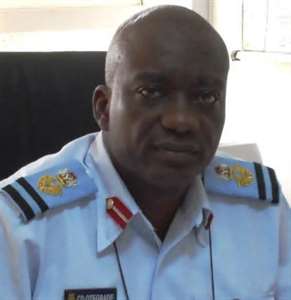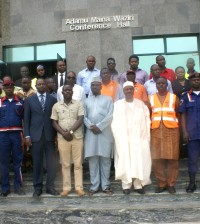NEMA records 80 distress alert signals from air and sea in 2012
 The National Emergency Management Agency (NEMA has disclosed that its Mission Control Centre (MCC) had received a total of 80 distress alert signals in 2012 from maritime, aviation and land users.
The National Emergency Management Agency (NEMA has disclosed that its Mission Control Centre (MCC) had received a total of 80 distress alert signals in 2012 from maritime, aviation and land users.
The Director General, Muhammad Sani-Sidi disclosed this at a stakeholders’ consultative meeting on coordination of satellite aided search and rescue services in Nigeria which was held in Lagos over the weekend.
Sani-Sidi added that the computer based satellite technology that uses the COSPAS-SARSAT hi-tech system/facility, had helped search and rescue officers to respond timely in saving victims from distress, especially on the high sea where most of the distress alerts come from.
The system is designed to pick distress alerts and location data to assist in search and rescue operations, using spacecraft and ground facilities to detect and locate the signals of distress beacons. It also facilitates the speedy location of distress alerts even in remote locations.
Represented by the Director ,Search and Rescue of the agency, Air Commodore Charles Otegbade, the NEMA boss explained that the meeting was convened to iron out the issues and challenges which could be used to optimise coordination between the various agencies in preventing air and marine disasters in 2013.
Issues discussed at the meeting included the high false alerts rate; roles of various stakeholders in following up alerts and reported cases of accidents where beacons do not trigger. Participants came from NIMASA, NCCA, NAMA, AIB, Police, Airforce, Navy, and operators in the both maritime and airline.
In another development, stakeholders had emphasised on value re-orientation for conflict and disaster management in Nigeria. This was the outcome of a workshop on “Peace building and conflict management for sustainable development in Nigeria.” Which was organized in Kaduna by the National Emergency Management Agency (NEMA) in collaboration with the Institute for Peace and Conflict Resolution, National Orientation Agency and National Boundary Commission.
The participants, who were mostly representatives of communities, religious bodies and non-governmental organisations, called for active collaboration among government and private organizations as well as communities to promote peaceful coexistence and safety through value re-orientation among the citizens.
They also pointed at the need for proactive measures backed by relevant laws for early warning and responses to conflicts and disasters.
They urged the government to empower relevant agencies with the mandates on conflict and disaster, while ensuring social justice and provision of amenities in the communities. They also emphasised on the need for job creation for the youth who are expected to contribute to the development of the country.







